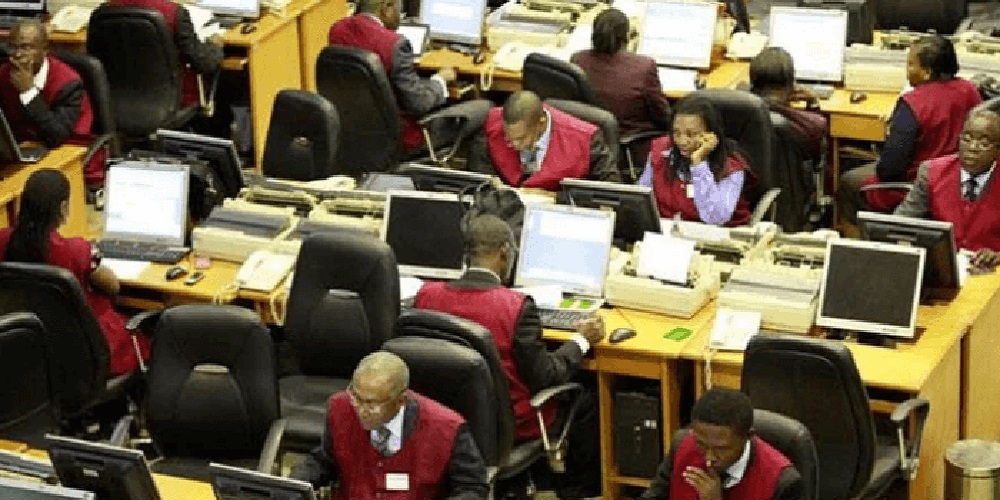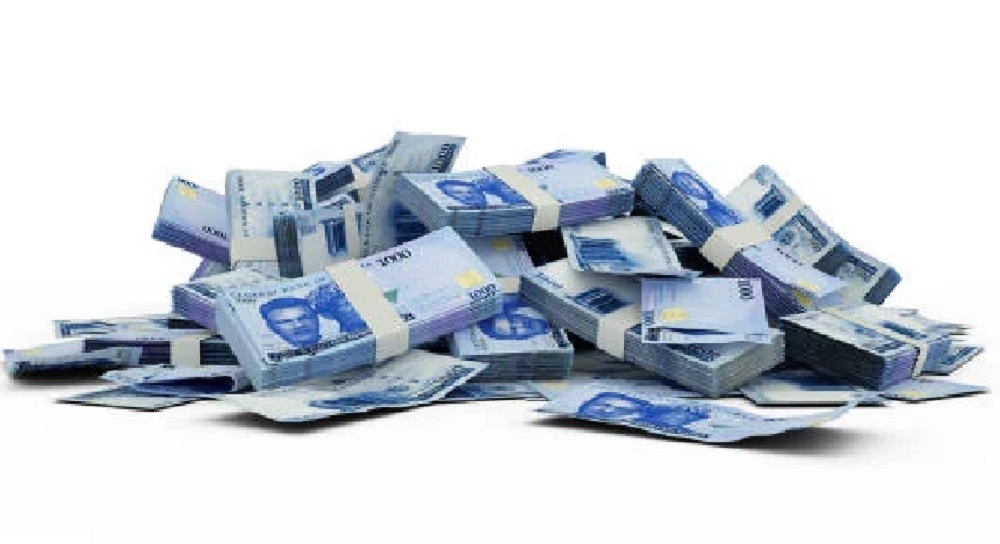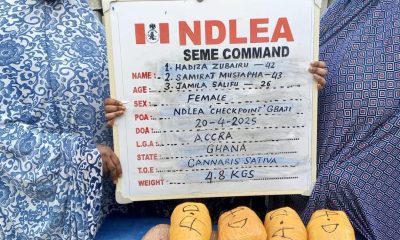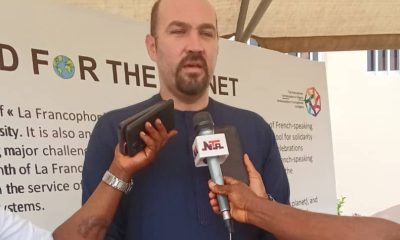Economy
Weekly Report: Equity Market Loses N1.32trn amid CBN Rate Hike

Equity investors on the Nigerian Exchange Ltd. (NGX) experienced a significant loss of N1.32 trillion in the just concluded week.
The downward performance was driven by selloffs in Tier-one banking stocks namely: Zenith Bank, Guaranty Trust Holding Company (GTCO), and also Dangote Cement, Dangote Sugar, African Prudential, among others.
Specifically, investors reacted negatively to the Central Bank of Nigeria’s (CBN’S) hike in the Monetary Policy Rate (MPR) announced within the week.
The News Agency of Nigeria (NAN) reports that CBNs Monetary Policy Committee (MPC) on Tuesday announced another increase in the country’s MPR by 50 basis point to 26.75 per cent, from 26.25 per cent.
Dr. Yemi Cardoso, CBN Governor, said the decision was in response to the continued inflationary pressures.
He noted that it was important to deal with inflation, as the apex bank was concerned over the impact of the inflation on ordinary Nigerians and businesses.
The NGX) All-Share Index and Market Capitalisation depreciated by 2.33 per cent each to close the week at 98,201.49 and N55.605 trillion respectively, against 100,539.40 and N56.929 trillion posted in the previous week.
Similarly, all other indices finished lower with the exception of NGX MERI Value which appreciated by 0.72 per cent while the NGX ASeM and NGX Sovereign Bond indices closed flat.
Also, 20 equities appreciated in price during the week, lower than 37 equities in the previous week.
Forty-seven equities depreciated in price, higher than 34 in the previous week, while 84 equities remained unchanged, higher than 80 recorded in the previous week.
Secure Electronic Technology Plc led 46 declined equities on the losers’ table by 26.32 per cent to close at 42k per share.
Sovereign Trust Insurance Plc led 19 other advanced equities on the gainers table by 14.29 per cent to close at 56k per share.
Meanwhile, a total turnover of 3.557 billion shares worth N47.220 billion in 42,871 deals was traded during the week by investors.
This is in contrast to a total of 2.827 billion shares valued at N42.366 billion that exchanged hands last week in 44,277 deals.
The Financial Services Industry measured by volume led the activity chart with 2.011 billion shares valued at N25.783 billion traded in 24,350 deals.
This contributed 56.52 per cent and 54.60 per cent to the total equity turnover volume and value respectively.
The Services industry followed with 1.020 billion shares worth N3.216 billion in 1,846 deals.
The third place was the Agriculture industry, with a turnover of 168.028 million shares worth N647.859 million in 1,473 deals.
Trading in top three equities namely: Tourist Company of Nigeria Plc, FCMB Group Plc and Abbey Mortgage Bank Plc measured by volume accounted for 1.876 billion shares worth N8.511 billion in 935 deals.
This contributed 52.73 and 18.02 per cent to the total equity turnover volume and value respectively.
Looking ahead to the coming week, Analysts at Cowry Asset Management Ltd., predicted that bearish trend is expected to persist.
The analysts said this is because market players would continue to digest the outcome of the recently published economic data and the interest rate hike by the apex bank.
They noted that the continued rise in yield levels within the fixed income and money market spaces is likely to maintain the unattractiveness of equities, as investors opt for the appealing yields.
“Nonetheless, a mildly positive performance is anticipated on the back of continued earnings releases and attractive dividend declarations by corporations in the coming week.
“As the market structure and fundamentals evolve, investors are advised to position themselves in stocks with sound fundamentals to navigate the prevailing conditions effectively,” the analysts stated.
(NAN)
Economy
States face allocation cuts as agency demands N100bn monthly

The monthly statutory allocations to state governments from the federation account may decline in the coming months following an official request by the Nigeria Sovereign Investment Authority to boost the nation’s residual funds with the support of N100bn monthly.
The request, which was presented by the Managing Director and Chief Executive Officer of NSIA, Aminu Umar-Sadiq, is aimed at unlocking large-scale investments to drive Nigeria’s economic growth.
He made the request at the March revenue-sharing meeting of the Federation Account Allocation Committee held between April 14 and 15, 2025. Our correspondent obtained a copy of his presentation during the meeting on Friday.
Umar-Sadiq appealed to the committee, which includes state commissioners of finance, to consider and approve the request, with funding proposed to commence from the March FAAC allocation.
The presentation was titled, “Activating Residual Funding for the Nigeria Sovereign Investment Authority – Unlocking Opportunities for Large-Scale Investments to Drive Nigeria’s Economic Growth.”
According to the document, the NSIA is requesting a structured monthly disbursement of N100bn from Residual Funds—revenues in the Federation Account beyond projected hydrocarbon income—to establish a Naira-based investible capital pool.
The move, the authority says, will enhance its capacity to finance critical domestic infrastructure projects.
The MD said, “The funding would position the authority as a leading sovereign wealth fund globally, promoting responsible and strategic investments for Nigeria’s economic development and enhancing its threefold mandate to build a savings base for the country, enhance the development of infrastructure, and provide stabilisation support.”
He explained that residual funds are a legitimate source of funds transferred to the authority, provided that the derivation portion of the revenue allocation formula shall not be included as part of this funding.
Economy
More Nigerians to experience poverty by 2027 – World Bank

The World Bank’s latest Africa’s Pulse report has projects a grim future for Nigeria, with poverty expected to rise by 3.6 percentage points by 2027.
Released during the IMF and World Bank Spring Meetings in Washington, DC, the report cites Nigeria’s reliance on oil, economic fragility, and governance challenges as key drivers.
It highlights the country’s structural economic weaknesses, dependence on oil revenues, and national fragility as key barriers to meaningful poverty reduction.
“Poverty in resource-rich, fragile countries, including large economies like Nigeria and the Democratic Republic of Congo, is projected to increase by 3.6 percentage points between 2022 and 2027,” the report stated.
Despite recent growth in Nigeria’s non-oil sector during the last quarter of 2024, the World Bank warns that this progress is unlikely to translate into widespread poverty alleviation due to ongoing fiscal and institutional challenges.
The report emphasizes that Sub-Saharan Africa remains the world’s poorest region, with an overwhelming 80% of the globe’s 695 million extreme poor residing there in 2024.
Within the region, half of the 560 million extremely poor people were located in just four countries, including Nigeria.
In stark contrast, South Asia accounted for 8% of the world’s extremely poor population, East Asia and the Pacific 2%, the Middle East and North Africa 5%, and Latin America and the Caribbean 3%.
The World Bank attributes the rising poverty in Nigeria and similar economies to weakening oil prices and fragile governance structures, noting: “This follows a well-established pattern whereby resource wealth combined with fragility or conflict is associated with the highest poverty rates, averaging 46% in 2024, which is 13 percentage points higher than in non-fragile, resource-rich countries.”
Meanwhile, non-resource-rich countries in Africa are experiencing stronger economic growth and faster poverty reduction, buoyed by high agricultural commodity prices and more resilient fiscal policies.
To reverse Nigeria’s downward poverty trend, the World Bank recommends reforms that prioritize inclusive economic growth and stronger public financial management.
It calls on the government to focus on “improving fiscal management and building a stronger fiscal contract with citizens to promote inclusive economic development and long-term poverty alleviation.”
Economy
SEE current exchange rate of the Dollar to Naira

What Is the Dollar to Naira Exchange Rate at the Black Market (Aboki FX)?
Here is the Dollar to Naira exchange rate at the parallel market, popularly known as the black market (Aboki fx), for Tuesday, April 23, 2025.
You can exchange your dollars for naira at the following rates:
Black Market Exchange Rate (Lagos – April 23, 2025):
According to sources at the Bureau De Change (BDC), the exchange rate at the Lagos parallel market saw traders buying at ₦1610 and selling at ₦1620 per US dollar.
It’s important to note that the Central Bank of Nigeria (CBN) does not recognize the black market. The CBN advises individuals seeking foreign exchange transactions to do so through their banks.
Dollar to Naira Exchange Rates
Market Type Buying Rate Selling Rate
Black Market ₦1610 ₦1620
CBN Official Rate ₦1591 (Low) ₦1606 (High)
Note: Forex rates vary across dealers and regions, and actual rates may differ from those listed.
Meanwhile, the Nigeria Customs Service (NCS) has announced the seizure of 298 smuggled items worth ₦7.6 billion between January and March 2025. The NCS also disclosed that it generated a total revenue of ₦1.75 trillion in the first quarter of the year.
-

 News18 hours ago
News18 hours agoGunmen abduct two senior LG workers, three others
-

 News3 hours ago
News3 hours agoJust in: Senator Natasha tenders satirical ‘apology’ to Akpabio
-

 News20 hours ago
News20 hours agoNDLEA storms Lagos hotel, recovers N1.042billion illicit drug consignments(Photos)
-

 News19 hours ago
News19 hours agoArmy Chief condemns beating, harassing civilians in military uniform says, it’s wrong
-

 News12 hours ago
News12 hours agoBenue LG chairman gives Fulanis 48hrs to leave all farmlands
-

 News17 hours ago
News17 hours agoFrancophone Ambassadors, Nigeria Unite To Fight Against Climate Change
-

 News12 hours ago
News12 hours agoFive suspected kidnappers eliminated by police in Delta
-

 Sports19 hours ago
Sports19 hours agoCopa del Rey: Barca pumel Real Madrid 3-2 to emerge winner





